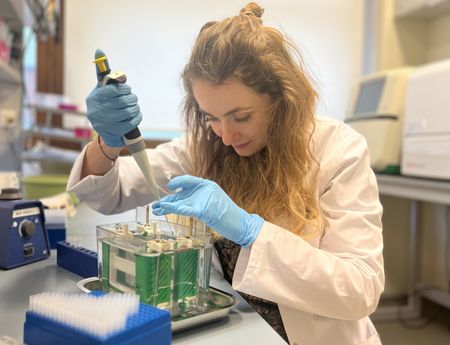
Dr Patrycja Kurowska from the JU Faculty of Biology has been selected to take part in a joint programme of the Polish Academy of Science and Japanese Society for the Promotion of Science. Thanks to the funding provided by the organisations, the project New insight on visfatin (Nampt) role in mouse embryo development will allow for an enhanced mobility of young scientists between the Jagiellonian University and Kyoto University.
Obesity is associated with many reproductive pathologies including disrupted oocyte quality and embryonic development as well as decreased fertility of offspring. Indeed, the accumulation of lipids in the oocyte and surrounding cumulus cells was shown to culminate with lipotoxicity and inflammation, cumulus cells apoptosis and oocyte mitochondrial dysfunction leading to infertility. Thus, new linkers between energy metabolism and reproduction are being intensively searched for. Adipose tissue hormones, adipokines, play an important role in the regulation of female reproduction. Literature data has shown that one of the adipokines, visfatin, is essential for the mice ovarian physiology including oocytes maturation and improve oocyte maturation in obese individuals.
‘The scientific aim of this project will be to determine the role of visfatin in the early embryogenesis in mice. In the cooperation with the Japanese team, we will silence visfatin (Nampt) mRNA expression (siRNA) in the embryo and examine its influence on embryonic development and offspring ovarian physiology by comparing normal weight and obese mice. Taking account of societal challenges the results of the research conducted as part of the project will provide new and unique information on the regulation of the reproductive function, embryo development and offspring ovarian function and the relationship between infertility, obesity, and adipokines action’, Dr Patrycja Kurowska explained.
Dr Patrycja Kurowska has graduated in biology from the Jagiellonian University in 2017. She started working on her PhD in the same year under the supervision of Dr hab. Agnieszka Rak, Prof. UJ. Since then, she has been studying the relationship between energy metabolism and female reproduction. In 2021, she successfully defended her PhD thesis entitled Expression and role of vaspin in porcine ovarian cells. During her PhD studies, she led two projects funded by the National Science Centre as well as participated in the international project Harmonia.
She expanded her knowledge of methodology during her numerous visits to Prof. Joelle Dupont’s laboratory in INRAE (France), where she practiced the methods of oocyte in vitro maturation and silencing gene expression in ovarian cells. After finishing her PhD, she did an internship at the University of Kyoto under the supervision of Prof. Naojiro Minami, where she learned the techniques of editing genes through the use of CRISPR/Cas9.
Currently, she is working at the JU Faculty of Biology Section of Physiology and Toxicology of Reproduction, where she coordinates a Polish-French project Description of new markers in polycystic ovary syndrome (PCOS): expression and function of SPEXIN in human ovarian cells in collaboration with Prof. Joelle Dupont.





